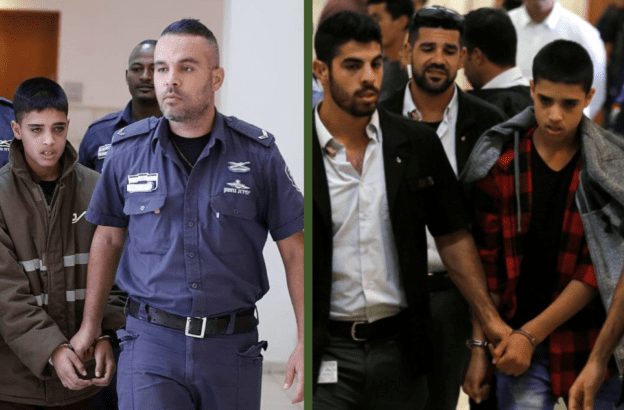Ahmed Manasra is escorted by Israeli security during a hearing at a Jerusalem court on October 30, 2015.
Ahmad Al-Manasra has been in Israeli prison since age 13, and suffers from prison-related mental illness. A hearing to review the now 21-year-old Manasra’s case is being held today.
by Yousef M. Aljamal and Zena Al-Tahhan, reposted from Politics Today and Al-Jazeera, April 12-13, 2022
Ahmad Manasra, age 13 in 2015, was initially sentenced to 12 years in prison, later reduced to nine years, for being with his cousin Hassan Manasra, who allegedly stabbed two Israeli settlers near the illegal settlement of Pisgat Ze’ev in occupied East Jerusalem in 2015.
Hassan, who was 15 at the time, was shot dead by an Israeli civilian, while Ahmad was severely beaten by an Israeli mob and run over by an Israeli driver, suffering fractures to his skull and internal bleeding.
Israeli settlers cursed him, damning him to death, and the Israeli police—as seen in videos of the incident—kept watching.
Despite not having participated in the attack – which the courts acknowledged – Manasra was charged with attempted murder.
A video of an Israeli interrogator violently interrogating then 13-year-old Palestinian child prisoner Ahmad Al-Manasra went viral in November 2015. In the video, Al-Manasra repeatedly told his Israeli interrogator that he couldn’t remember as his interrogator screamed at him, accusing him of not telling the truth.
The issue of Palestinian prisoners impacts every single Palestinian family, with nearly a million Palestinians arrested by Israel since 1967. At the end of February 2022, 4,400 Palestinians were arrested by Israel, of whom 160 are children and 33 women, while 490 have been placed under administrative detention without a charge or trial.
The harshest of conditions
The Israeli occupation authorities have a separate military judicial system before which Palestinians are brought to court, unlike Israelis who live in the same area in illegal settlements in the West Bank. Palestinians brought before military courts are handed tough sentences and their conviction rates are extremely high.
Since Israeli law at the time did not allow convicting children below 14, the Israeli authorities waited for Al-Manasra to turn 14 before convicting him, handing him a sentence of 12 years. Al-Manasra’s sentence was later reduced to 9.5 years.
A new law states that it is permissible “to imprison a minor convicted of serious crimes such as murder, attempted murder or manslaughter.”
Following much physical and psychosocial violence, Al-Manasra’s mental health has deteriorated significantly—a process that only got worse when he was placed in solitary confinement. The Israeli Prison Service (IPS) has isolated Al-Manasra since November 2021, claiming that his mental health is not stable and putting him with other inmates might cause harm to them.
In December 2021, an external doctor was allowed to visit Manasra for the first time since his imprisonment. The doctor, a psychiatrist from Doctors Without Borders (MSF), issued a medical report, which has since been attached to his case file, stating that Manasra suffers from schizophrenia.
“He is suffering, he is a chronically mentally ill patient, and there is a real danger to his life. The last time I visited him, three weeks ago, he asked me whether I am sure if it is unlawful in Islam for people to [kill themselves],” Zabarqa said.
“His condition would make a stone cry”
Al-Manasra’s family stressed that the Israeli authorities refused to release him from solitary confinement and put him in the normal prison sections as recommended by a mental health specialist who was able to pay him a rare visit. The specialist condemned the Israeli authority’s claim that the reason for placing Al-Manasra in solitary confinement was to protect him and the rest of the prisoners following the deterioration of his mental health.
In a recent statement, Al-Manasra’s mother called for his immediate release, noting that her son is “a child whose condition would make a stone cry.” She added that her son needs her and that not being able to meet face to face is costing him dearly.
In light of this reality and following a call for solidarity with Ahmad Al-Manasra by his family, an international campaign was launched. The hope is that this call for solidarity will pressure the Israeli authorities to improve his prison conditions and move him to the regular prison sections.
“We want to attest to the fact that Ahmad has been subjected to continuous punishment and abuse, multiple physical, psychological, and social torture, including deprivation from family connectivity, visits and communication with his parents and brothers, and recent solitary confinement,” the Palestine-Global Mental Health Network said in a March 6 statement.
The imprisonment conditions of Palestinian prisoners, especially child prisoners, has been documented by various human rights groups. Defense for Children International-Palestine (DCI-P) notes that three out of four Palestinian prisoners are subjected to ill-treatment and torture at the hands of Israeli forces from the moment of their arrest.
The deteriorating mental health of Al-Manasra is the logical outcome of Israeli prison conditions where Palestinian prisoners are held lacking the minimum standards of human dignity. Such conditions push Palestinian prisoners to stage both individual and mass, open-ended hunger strikes to improve their prison conditions.
Prison for children – and their lawyers
The case of the five Hares boys from Hares village in the West Bank speaks of Israel’s systemic injustice toward Palestinian children. In 2013, five Palestinian children were snatched from their families and sentenced to 15 years in prison after being accused of throwing stones at an Israeli truck driver who lost control of the steering wheel, a charge they denied and later some of them confessed to under torture, according to their families.
The Israeli truck driver, who hit another Israeli settler car causing the death of an Israeli settler, first said the incident was due to a flat tire and later changed his narrative, which Israeli courts adopted. The Hares boys had to sign confessions in Hebrew, a language they don’t understand.
The issue of Palestinian child prisoners is generational. It is no surprise that Tariq Bargouthi, the Palestinian lawyer of Ahmad Al-Manasra, was himself a child prisoner in 1991. Israeli forces arrested him in an attempt to pressure his brothers to hand themselves over.
Bargouthi was arrested again in 2019 after defending Al-Manasra and was sentenced to 13.5 years in Israeli prison by the Ofer Military Court, the same court where he once defended several cases of Palestinian child prisoners. Many viewed the sentence as an attempt to silence lawyers who defend Palestinian child prisoners.
No Way to Treat a Child
Palestinian child prisoners should receive the attention of the world whose deafening silence allows for the violations against them to continue. Such efforts should build on previous campaigns and initiatives including “No Way to Treat a Child,” a campaign launched by the American Friends Service Committee (AFSC) of the Quaker Church in the U.S. Legal actions should be taken in various parliaments across the globe to provide protection for Palestinian children.
The U.S. House of Representatives draft bill H.R.2590 calls for linking American foreign aid to countries’ treatment of children, including Israel. The bill calls for making sure that Palestinian children’s rights are not violated by American tax money. Other draft laws and bills could be introduced at a national level in other countries to build more pressure on Israel to end its military occupation of Palestine.
Ahmad Al-Manasra could not remember the day he was shot and humiliated by Israeli settlers in Jerusalem. It is the same day that many advocates for Palestinian human rights vividly recall: it was the day Ahmad lost his best friend and cousin Hassan, and he himself was left to bleed on the ground as Israeli settlers cursed him and wished for his death.
The free people of the world should always remember Ahmad Al-Manasra as a victim of the ongoing settler violence and an Israeli judicial system designed by settlers to serve their interests exclusively. The least the world can do today to highlight Al-Manasra’s plight and ongoing suffering is to join the campaign that calls for his immediate release, as a court hearing is set for him on April 13, 2022, so that he can have access to much needed medical care.
ESSENTIAL READING ON ISRAEL’S TREATMENT OF CHILDREN:
- Palestinian children held in solitary confinement by Israel surges
- 53,000 Palestinian children detained by Israel since 1967
- 2021 was deadliest year for Palestinian children since 2014
- Israeli soldiers illegally photograph Palestinian children in middle of night
- Israel kills children, doctors in horrific nighttime massacre
- Israel detains, interrogates four Palestinian children, ages 9-10
PROPOSED LEGISLATION TO PROTECT PALESTINIAN CHILDREN:
- Rep. Betty McCollum leads effort to block Israel from using US aid to break int’l law
- 95% of Congress is ok with Israel’s torture of Palestinian children
RELATED READING:
VIDEOS:





